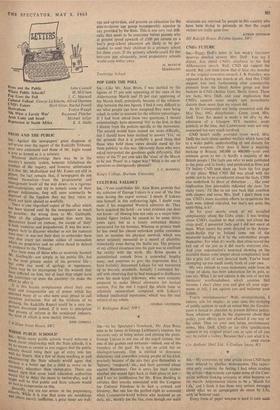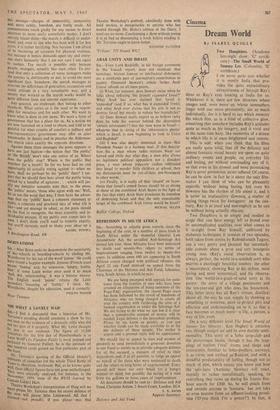SIR,—My comments on ). our article about CND have been
delayed by another Aldermaston. The experi- ence only confirms the feeling I had when reading the article—that nobody can make sense of the Cam- paign without looking seriously at what happens on the march. Aldermaston claims to be a 'March for Life,' and 1 think it has three very serious messages about wjiat we as campaigners do mean by Life, with Or. *ithout caps.
Every form of paper weapon is used to turn aside
this message—charges of immorality, immaturity and, more subtly, boredom, are freely made. All commentators reach gladly for any excuse to divert attention to more easily assimilable matter. I don't entirely blame them—the march is difficult to under- stand, and, even to one who has been with it for five years, it is rather terrifying. Not because I am afraid of its becoming an occasion for physical violence, but because it makes demands upon my and every- one else's humanity that I am not sure I am equal to sustain. The march is possible only because People, strangers, actually like each other. To pre- tend that only a collection of noisy teenagers make the journey is, deliberately or not, to avoid the most significant fact. Somehow, the march manages to override the differences of generation, occupation and social attitude in a very remarkable way, and a society that worked as the march works would be quite different from our current experience.
Any quarrels are irrelevant; they belong to other standards. What unites us is the need to be respon- sible for ourselves and for each other. We want to know what is done in our name. We want a form of government that has a place for us. As a nation we are now launched on a road to chaos, and told to be grateful for what crumbs of comfort a military and non-representative government may offer us after catastrophe. In theory and in practice the Aldermas- ton march takes exactly the opposite direction. Against these three messages the press appears to have one last bastion—the notion that `the public' or the British' won't take any notice of us. Where does the public stop? Where is the public that Marches for a bomb? So far we have had no real oPPortunity of actually voting against it—when we have, shall we perhaps be the 'public' then? I sus- Peet that we should then hear about the public being Misled by a handful of agitators . . . which will jus- tify my tentative semantic note that, to the press, the 'public' means 'those who agree with me.' Well, let us use the word that way. I then have the advan- tage that my 'public' have a coherent statement to make, a coherent and practised idea of what life is rake—and yet manage to admit, as the press should be the first to recognise, the most eccentric and in- dividualist persons. If my public ever comes into its own, I don't think you'll need' to tremble exactly, but you'll certainly need to shake your ideas up a







































 Previous page
Previous page